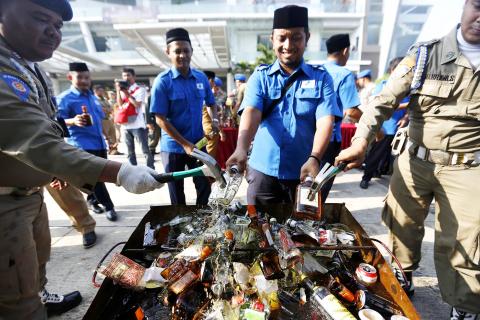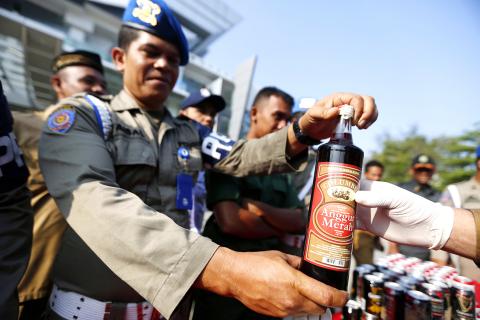IB Agung Partha foresees an apocalypse, as he put it, on the Indonesian resort island of Bali.
The threat is not a plague of locusts, nor one of Bali’s dormant volcanos springing to life. It is in Jakarta, the Indonesian capital several hundred miles away, where Parliament is debating legislation that would ban beer, wine and spirits across the thousands of islands that make up this country.
For Bali, whose beaches, lush landscapes and cultural attractions drew 4 million visitors last year, the effect would be something like the end of the world, said Partha, chairman of the Bali Tourism Board.

Photo: EPA
“Hotels have bars, restaurants have bars, and they serve alcohol — this is just part of tourism,” he said. “This bill is just no good.”
Alcohol bans have been proposed before in Indonesia, by the same Islamic political parties that are pushing the current bill. Their scripture-based arguments gained little traction in Indonesia’s multifaith society, which is mostly Muslim but has a secular government.
But this time, those parties have taken a new line: that alcohol should be banned for health reasons, not religious reasons. And a passive response to the legislation by Indonesia’s dominant secular parties, which could have quashed it months ago, has some worried that it could become law.

Photo: EPA
“For me, it’s all about pluralism and human rights,” said Rudolf Dethu, a leader of two groups opposing the legislation, one of which organizes social events to promote the culinary aspects of beer.
“It’s not just about alcohol — there’s something bigger behind this,” Dethu said. “First it’s drinking, and then rules on who you can date and what time you can go out at night, and it’s not in the Indonesian culture to say no to authority.”
ALTERIOR MOTIVES
There have long been fears about creeping Islamization in Indonesia, which is the world’s most-populous Muslim-majority nation but has influential Christian, Hindu and Buddhist minorities. (The vast majority of Bali’s residents are Hindu.)
Political Islam has made gains here since Indonesia began moving toward democracy in 1998, after the ouster of its long-ruling authoritarian president, Suharto. In the past decade, autonomous regional governments have passed hundreds of local bylaws inspired by Islamic law, many of which enforce morality codes. The country’s Constitutional Court is hearing a petition by an Islamist group demanding that gay sex be outlawed, and that an existing adultery law be expanded to include sex between unmarried persons.
The bill before Parliament would ban the production, distribution, sale, consumption and possession of alcoholic beverages among Indonesians and foreign tourists alike. Violators could face up to 10 years in prison.
Critics of the Islamic parties backing the bill — which have the support of hard-line Muslim groups that have sometimes engaged in violent intimidation — say their concern for drinkers’ health is a cover for pushing Indonesia toward becoming an Islamic state under Shariah law.
Mohammad Arwani Thomafi, a lawmaker from the Islam-based United Development Party and chairman of a special legislative committee debating the bill, said his party was merely acting out of concern for public health.
“Prohibition should be a legal requirement to protect the public,” he said, citing “dozens” of deaths across Indonesia each year directly linked to drinking.
TANGIBLE CONNECTION TO ALCOHOL
But while that statistic is accurate, none of those deaths were connected with alcohol sold legally in stores, bars and restaurants — mostly to relatively affluent Indonesians and to foreigners. Rather, they were caused by illegally brewed spirits, an underground industry involving hundreds or perhaps thousands of producers, to which the Indonesian police have largely turned a blind eye.
The Center for Indonesian Policy Studies in Jakarta, citing local media reports, said there had been 453 deaths and 373 injuries from drinking alcohol since 2012. All were from illegally distilled alcohol, locally known as “oplosan,” which can contain a variety of substances including methanol, medicinal alcohol, fruit extract and toxic substances such as mosquito repellent.
And 83 percent of those deaths occurred in autonomous districts with Shariah-inspired bans or restrictions on the sale of alcohol, said the center’s executive director, Rainer Heufers.
Such regulations “do not increase public morality and health,” Heufers said. “Instead, they push the consumption from legally produced and traded alcohol to illegally produced and traded alcohol, which leads to more deaths and injuries.”
President Joko Widodo’s governing coalition, which plays a key role in drafting legislation and holds a majority in Parliament, is against the ban. His government has proposed increased regulation instead, including mandatory licensing for stores that sell alcohol and identification checks for buyers.
NOT A HEALTH CRISIS
Alcohol has been consumed in Indonesia for centuries, and it is an integral part of cultural and religious ceremonies among some of the country’s more than 300 ethnic groups. A survey of 1,600 people in eight Indonesian cities, conducted by another Jakarta-based research institute, the Center for Strategic and International Studies, found that most respondents did not regard drinking as a health crisis.
“The Indonesian public does not consider this alcohol issue an urgent matter, but some of our politicians do,” said David Christian, a researcher with the group.
Christian said that study only looked at the national economy, not at the presumably more severe effects a ban would have on places like Bali or Jakarta, which has hundreds of upscale hotels, restaurants, wine bars and pubs.
Prohibition would also trigger the implosion of the US$600 million local alcoholic beverages industry, shutting down Indonesian companies that produce spirits, beer and cider (and closing three wineries in Bali). The largest of these companies is Multi Bintang Indonesia, which brews Bintang, the national beer, and is also the local brewer of Heineken and Guinness.
The company — which opened in 1931, when Indonesia was under Dutch rule — operates the first Heineken brewery opened outside of the Netherlands, had net sales of US$220 million last year, and has a market capitalization of more than $1 billion. The company also invested $50 million during the past two years to upgrade and expand its operations, all of which could be lost, said Michael Chin, the company’s president director.
“Obviously I am concerned, but it does not stop us from engaging the government and Parliament on a regular basis” about the proposed ban, Chin said. “There is no health crisis that is related to legitimate alcohol.”
Warning: Excessive consumption of alcohol can damage your health.

April 14 to April 20 In March 1947, Sising Katadrepan urged the government to drop the “high mountain people” (高山族) designation for Indigenous Taiwanese and refer to them as “Taiwan people” (台灣族). He considered the term derogatory, arguing that it made them sound like animals. The Taiwan Provincial Government agreed to stop using the term, stating that Indigenous Taiwanese suffered all sorts of discrimination and oppression under the Japanese and were forced to live in the mountains as outsiders to society. Now, under the new regime, they would be seen as equals, thus they should be henceforth

Last week, the the National Immigration Agency (NIA) told the legislature that more than 10,000 naturalized Taiwanese citizens from the People’s Republic of China (PRC) risked having their citizenship revoked if they failed to provide proof that they had renounced their Chinese household registration within the next three months. Renunciation is required under the Act Governing Relations Between the People of the Taiwan Area and the Mainland Area (臺灣地區與大陸地區人民關係條例), as amended in 2004, though it was only a legal requirement after 2000. Prior to that, it had been only an administrative requirement since the Nationality Act (國籍法) was established in

With over 80 works on display, this is Louise Bourgeois’ first solo show in Taiwan. Visitors are invited to traverse her world of love and hate, vengeance and acceptance, trauma and reconciliation. Dominating the entrance, the nine-foot-tall Crouching Spider (2003) greets visitors. The creature looms behind the glass facade, symbolic protector and gatekeeper to the intimate journey ahead. Bourgeois, best known for her giant spider sculptures, is one of the most influential artist of the twentieth century. Blending vulnerability and defiance through themes of sexuality, trauma and identity, her work reshaped the landscape of contemporary art with fearless honesty. “People are influenced by

The remains of this Japanese-era trail designed to protect the camphor industry make for a scenic day-hike, a fascinating overnight hike or a challenging multi-day adventure Maolin District (茂林) in Kaohsiung is well known for beautiful roadside scenery, waterfalls, the annual butterfly migration and indigenous culture. A lesser known but worthwhile destination here lies along the very top of the valley: the Liugui Security Path (六龜警備道). This relic of the Japanese era once isolated the Maolin valley from the outside world but now serves to draw tourists in. The path originally ran for about 50km, but not all of this trail is still easily walkable. The nicest section for a simple day hike is the heavily trafficked southern section above Maolin and Wanshan (萬山) villages. Remains of